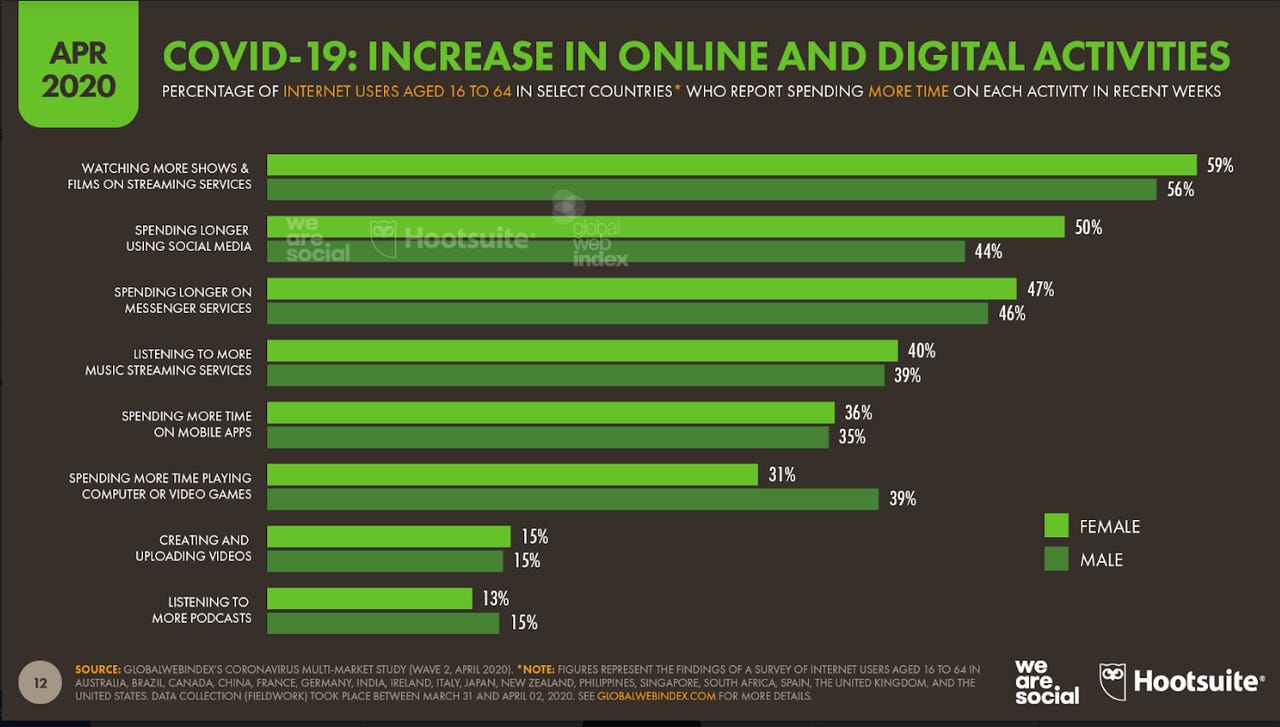COVID-19 has significantly changed our media habits according to new report

As you continue your life in lockdown are you spending more time browsing the internet from your mobile device? Across the world, many of us are doing just that according to a new report.
Vancouver, BC-based social media management platform Hootsuite, in conjunction with London, England-based creative agency We Are Social, and Singapore-based brand agency Kepios has released its Digital 2020 Global Statshot report for April 2020.
It polled users across 17 countries around the world in March 2020 to ask about changes in their behaviour since the lockdown due to the novel coronavirus.
Its report highlights the change in our online behaviour since the COVID-19 pandemic has kept us indoors.
It uses data from a variety of sources to minimise data variations and ensure a reliable comparison across countries.
Digital usage around the world has grown from April 2019 to April 2020. Although the total population has grown by only 1.1% (82 million), the number of mobile phone users has increased by 2.5% (128 million), internet users have increased by 7.1% (301 million), and active social media users have increased by 8.7% (304 million).
There are 4.20 billion users globally who access the internet through mobile devices. As we hunker down in lockdown we have been spending more time with our mobile devices.

Three from four (76%) internet users reported that they have been spending more time on their smartphones, 45% on their laptops, and 22% have been spending more time using their tablet devices.
So what are we doing online? Almost three in five (57%) reported that they are watching more shows and films on streaming services. Almost half are spending longer on social media (47%) and messenger services (46%).
An average of 47% globally reported spending more time shopping online in recent weeks with one-third using online shopping for food and groceries (33%), or household essentials (29%).
This has resulted in traffic to supermarkets increasing by 251% during the first six weeks of 2020. Conversely, there was a decrease of 71% to tourism websites.
Over one in three report listening to more music streaming services (39%), spending more time on mobile apps (36%) and playing computer or video games (35%).
Users also reported wanting more of certain types of content.
Almost half (47% female and 50% male) users wanted more movies, and almost a third (35% female and 30% male) wanted repeats of popular classic TV shows. Only 11% of users wanted more updates from bloggers and vloggers.
We are educating ourselves about the virus. During March, searches for COVID 19 increased by 3,650% and 18 out of the top 20 searches were about the coronavirus, and its progression.
There was a 500% increase in Google queries for the video conferencing platform Zoom.
However, as soon as lockdown finishes, our behaviour will change again. Only one in five (20%) respondents plan to continue watching more shows and films on streaming services, 15% plan to spend longer on social media, and 16% plan to spend longer on messenger services.
Only one in ten (10%) plan to spend more time on mobile apps, or playing computer or video games.
As life returns to the 'new normal' – whatever that will be - we will continue to enjoy increased access to the social and streaming sites that have kept us going through these unprecedented times.
Related content
Over half of the calls people receive now are spam
These uncertain times are prime opportunities for scammers to prey on the masses.
Americans want an internet bill of rights to protect their online data
The US is cracking down on data collection and privacy laws – but what do Americans think about their internet rights?
AgeBlock app launched to ensure age restrictions for online content
As we stay at home during the lockdown parents are concerned about children accessing pornography and other harmful online materials via their smartphones.
Quarantine and chill: Here's the information the Netflix stores about you
With a growing number of people around the world self-isolating at home, people are looking for ways to keep themselves entertained. What better way than binge-watching the TV series you have been meaning to but did not have the time?